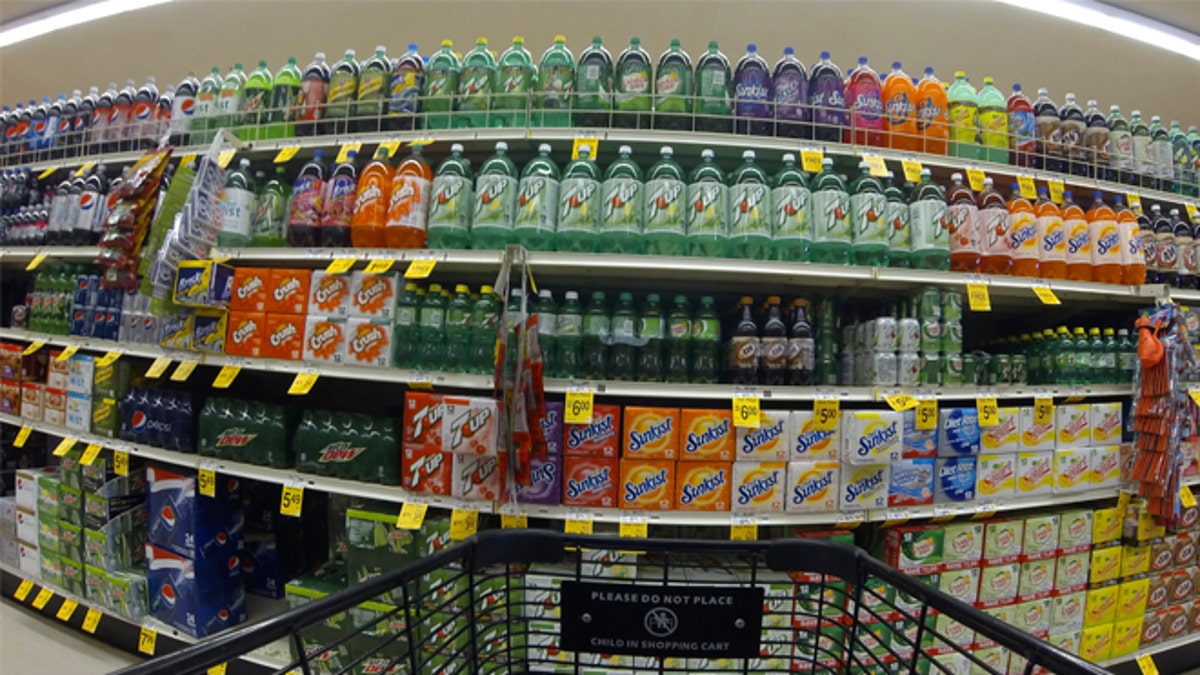
Numerous varieties of soda are shown for sale at a Vons grocery store in Encinitas, California. (REUTERS/Mike Blake)
A voluntary effort by the world's largest food and beverage companies to remove billions of calories from the products they sell in the United States to help combat the nation's obesity epidemic has far exceeded its five-year goal, according to an independent evaluation released on Thursday.
In May 2010, 16 of the nation's biggest food and beverage companies, from Coca-Cola Co to Kraft Foods Group, pledged to remove 1 trillion calories from the U.S. marketplace by 2012 and 1.5 trillion by 2015, compared with a 2007 baseline. In fact, as of 2012 they sold 6.4 trillion fewer calories, found an analysis by researchers at the University of North Carolina at Chapel Hill (UNC).
"Reports like this, and the fact that they exceeded their commitment by four-fold, really shows that you can make progress in giving American families more healthy options," said Larry Soler, president of the Partnership for a Healthier America, a non-profit chaired by first lady Michelle Obama. The group was formed in 2010 to work with the private sector on anti-obesity strategies.
At the time, critics said the Partnership relied too heavily on the good will of the industry and could not replace the role of tighter regulation on how food is manufactured and marketed.
Such voluntary efforts by industry "are not a magic bullet," said Jeff Levi, executive director of Trust for America's Health, a non-profit policy group. "Particularly with kids, there is a role for regulation" in reducing demand for unhealthy, high-calorie fare.
It is not clear yet how the companies accomplished the dramatic calorie reduction, said UNC public health researcher Barry Popkin, who led the analysis funded by the Robert Wood Johnson Foundation, the nation's largest public health philanthropy. Some of the decline may have come from the recession, as financially-strapped families cut back on junk food.
When the pledge was announced, companies said they would substitute lower-calorie products, re-engineer existing products to cut their calories, and reduce portion size, such as with the popular 100-calorie packs of cookies and other snacks.
Popkin and his team have found that beverage companies are producing more drinks that have both sugar and artificial sweeteners and, therefore, fewer calories than sugar-only drinks. They are also "shifting advertising to lower-calorie beverages," he said, as Coca-Cola and PepsiCo both did.
The biggest reduction in calories sold was to households with young children. "It seems to be parents who are driving the calorie reductions," Popkin said.
It is also not clear whether the reduction can move the needle for more than two-thirds of Americans who are overweight or obese. The 6.4 trillion fewer calories works out to 78 fewer calories per person per day, if spread equally across the 2012 U.S. population. By comparison, Americans consume an average of 300 more calories a day now than in 1985 and 600 more than in 1970, according to a 2012 report by Trust for America's Health.
Other companies that made the calorie-reduction pledge are Bumble Bee Foods, Campbell Soup Co, ConAgra Foods, General Mills, Hillshire Brands, Kellogg Co, Mars, McCormick & Company, Nestlé USA, Post Foods, the Hershey Company, J.M. Smucker and Unilever.
They are part of the Healthy Weight Commitment Foundation, a chief-executive-led organization formed in 2009 that aims to reduce obesity. According to the U.S. Centers for Disease Control and Prevention, 35.7 percent of U.S. adults are obese (having a body mass index above 30, such as 175 pounds on a 5 foot, 4 inch frame). So are 14.9 percent of children, which is down from 15.2 percent in 2003.
The 16 companies sold 60.4 trillion calories in 2007, which was 36 percent of total calories in packaged foods and beverages -- cereals, chips, canned soup, juices, sodas, candy and more -- sold that year. In 2012 they sold 54 trillion calories.
To calculate the calories sold, the UNC researchers combined data on foods and beverages sold (from grocery-store scanners and other sources) with nutritional information for the products.
